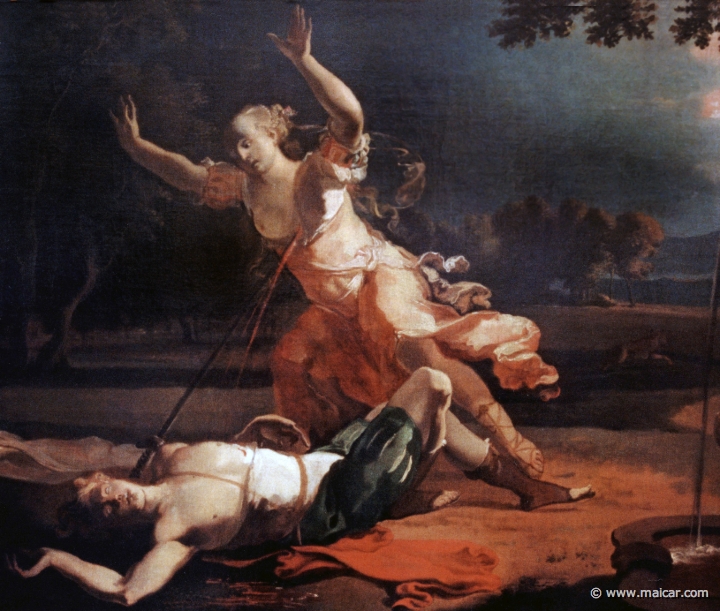| Lived in Babylon
Pyramus and Thisbe 1 lived in the city of Babylon which Queen Semiramis founded after having killed her husband King Ninus of Assyria and founder of Nineveh. At the time the city was surrounded by a wall made of baked brick and bitumen bound with iron, which was one of the wonders of the world.
Separated by a wall
Another wall separated the houses of Pyramus and Thisbe 1 which were side by side. The young man and the girl loved each other, and would have married, but their parents forbade. Not having a go-between they communicated just by nods and signs. Later, their love discovered a slender chink in the wall which became the channel of their speech, and they talked to each other until night came, printing in each side of the wall the kisses they were prevented to give each other.
Leaving home
|

|
Thisbe 1 lets herself fall upon Pyramus' sword. 3928: Abraham Hondius: Pyramus en Thisbe ca. 1625/30-1691/95. Museum Boijmans van Beuningen, Rotterdam.
|
|
Not being able to endure the separation, they decided to escape one night and to meet at Ninus' tomb under the shade of a mulberry tree. Thisbe 1 was the first to arrive with her face well veiled, but as she was waiting for Pyramus, a lioness came for water to a nearby spring. Her jaws dripped with the blood of the cattle she had slain, and at this sight Thisbe 1 escaped to a near by cavern, but as she hastened to elude the beast, she left her cloak on the ground behind her.
Death of Pyramus
The lioness quenched her thirst and by chance came upon the cloak, tearing it with her bloody jaws. A little later Pyramus arrived, and seeing the lioness and the cloak, he assumed Thisbe 1 to be dead, and in desperation, grief, and guilt, plunged his sword into his side, drawing it straightaway from the wound. As he lay stretched, the jets of blood leaped high, turning into dark red the white fruit of the tree.
Death of Thisbe 1
When Thisbe 1 came out of her hiding fearing her lover would miss her, she found Pyramus lying under a tree with colours she did not recognize. Pyramus saw her in a last effort, and when he died Thisbe 1 lamented:
"O wretched
parents, mine and his, grant those whom love and
death has joined to be laid together in the same
tomb." (Ovid, Metamorphoses 4.155).
And also:
"O tree, who
now shade with your branches the poor body of one,
and soon will shade two, keep the marks of our
death and always bear your fruit of a dark colour
as a memorial of our double death." (Ovid, Metamorphoses 4.160).
Having said so, she took the sword and killed
herself. But the remains of both funeral pyres rest
together in the same urn, and ever since the colour
of the mulberry fruit is dark red when ripe.
|